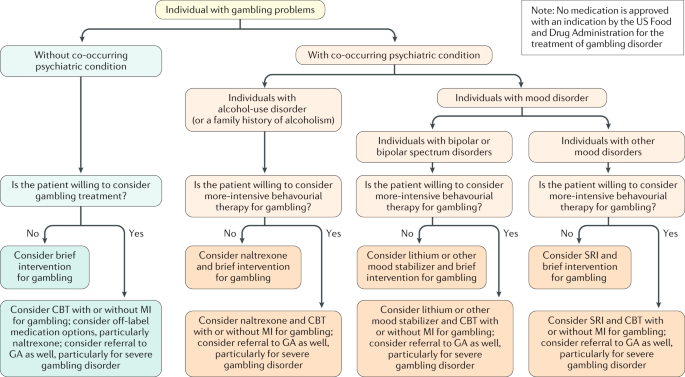Cbt And Gambling
A Cochrane systematic review found that CBT reduced the amount of money lost and the severity of gambling. 9 Another systematic review and meta-analysis found that CBT was highly effective in reducing problem gambling for all types of gambling up to 24 months after people completed therapy. Cognitive behavioral therapy for gambling addiction.pdf. Content uploaded by Steliana Rizeanu. All content in this area was uploaded by Steliana Rizeanu on Mar 28, 2018. Background: There is evidence supporting the use of cognitive-behavioral therapy (CBT) in the treatment of problem gambling. Despite this, little is known about how CBT works and which particular. Background: There is evidence supporting the use of cognitive-behavioural therapy (CBT) in the treatment of problem gambling. Despite this, little is known about how CBT works and which particular approach is most effective. This paper aims to synthesize the evidence for current CBT and propose a more unified approach to treatment. CBT for problem gambling: a unified approach. Cognitive-Behaviour Therapy for problem gambling: a critique of current treatments and proposed unified approach. Abstract: Background: There is evidence supporting the use of cognitive-behavioural therapy (CBT) in the treatment of problem gambling. Despite this, little is known about how CBT.

What is Pathological Gambling
Pathological gambling, also known as compulsive gambling or disordered gambling, including harmful physical, psychological and social effects, is a recognized psychiatric illness marked by a history of continued gambling. In this article, we will talk about pathological gambling addiction.
Gambling is a widespread activity. Although the type of games played over the years varies, gambling addiction, which is a challenge in impulse control, persists every term. Nowadays, sports betting games especially played through the internet, are becoming increasingly common. The ability to place, track, and deposit / withdraw… These bets on the internet make it very easy to get addicted.
Individuals with gambling addiction;
- Ponders over gambling (for example, reliving past gambling experiences, blocking or designing the next game, or contemplating ways to raise money for gambling),
- Needs to gamble with large amounts of money to get excited.
- Attempts to control, reduce, or quit gambling many times,
- Uses gambling to avoid problems or to get rid of a negative mood (eg feelings of helplessness, guilt, anxiety, depression),
- Gambles again to get the lost money.
- Lies to family members, therapists or others to hide how much they are gambling,
- Engages in illegal acts, such as fraud, theft, embezzlement, to provide the money needed to gamble,
- Jeopardizes or loses an important relationship, work or education, or an opportunity to gain success in or from a profession, due to gambling.
Antidepressant, anticonvulsant and antipsychotic drugs that are useful in the treatment of this disorder to provide impulse control. Cognitive behavioral therapy is the most common herapy. Besides that, environmental regulations, treatments for possible underlying mental disorders and family management are the other reasons.
AuthorRecent PostsCindy BrownCurrently studying psychology and researching cognitive behavioral therapy. Also have studied comprative literature,interested in gender studies,.Latest posts by Cindy Brown
 (see all)
(see all)